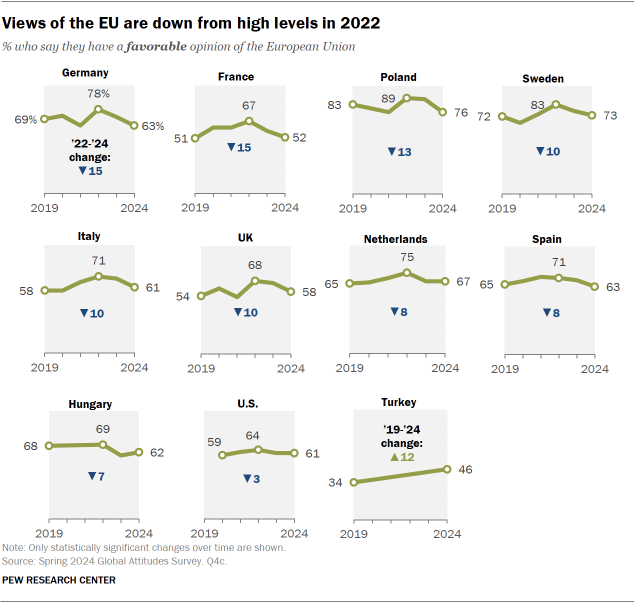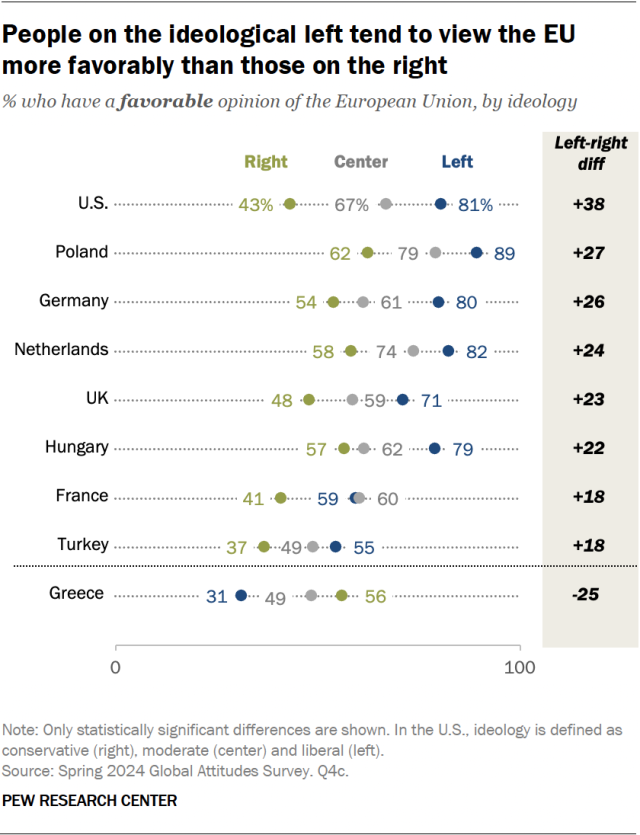Voters across Europe will head to the polls this week to choose their representatives in the European Parliament, the only directly elected institution of the European Union. A new Pew Research Center survey finds that a median of 63% of adults in nine member countries have a favorable view of the EU.
This Pew Research Center analysis focuses on public opinion of the European Union in nine surveyed EU member countries, as well as in the United Kingdom, the United States and Turkey.
For non-U.S. data, this report draws on nationally representative surveys of 11,294 adults conducted from Jan. 11 to May 15, 2024. All surveys were conducted over the phone with adults in France, Germany, Greece, Italy, the Netherlands, Spain, Sweden and the United Kingdom. We conducted face-to-face surveys in Hungary, Poland and Turkey.
In the U.S., we surveyed 3,600 U.S. adults from April 1 to 7, 2024. Everyone who took part in this survey is a member of the Center’s American Trends Panel (ATP), an online survey panel that is recruited through national, random sampling of residential addresses. This way nearly all U.S. adults have a chance of selection. The survey is weighted to be representative of the U.S. adult population by gender, race, ethnicity, partisan affiliation, education and other categories. Read more about the ATP’s methodology.
Here are the questions used for the analysis, along with responses, and the survey methodology.

In two surveyed countries that are not EU members – the United States and the United Kingdom – majorities also have a favorable view of the organization. But in the third surveyed nonmember country, Turkey, attitudes are divided (46% favorable, 50% unfavorable).
Among the member countries surveyed, views of the EU are most positive in Poland and Sweden, where roughly three-quarters hold a favorable view. In Germany, Hungary, Italy, the Netherlands and Spain, at least six-in-ten adults evaluate the EU positively. Views are more tempered in France and Greece. For example, 53% of adults in Greece hold a negative opinion of the EU.
How views of the EU have changed over time
Opinions of the EU reached record highs in many member countries in 2022, following Russia’s invasion of Ukraine.
Favorability slipped somewhat in 2023, and this year, the downward trajectory has continued in most countries. In 2021, for example, 63% of Germans had a favorable view of the EU. A year later, a record high 78% of Germans expressed a positive opinion, but that fell to 71% in 2023 and 63% in the new survey.
Poland has seen the greatest decrease in favorable views of the EU since 2023, though views there remain broadly positive. The vast majority of Poles (88%) expressed a favorable view of the EU in 2023, but that percentage slipped to 76% this year. The drop in favorability has come amid protests by Polish farmers against EU climate policies and Ukrainian imports.

How people in Turkey view the EU
In Turkey – which has been working toward EU membership since 1987 – ratings are the highest they’ve been since 2004, the year the Center began asking this question. Today, 46% of Turkish adults say they have a favorable view of the EU. In 2019, when we last asked, only 34% said this.
Related: How exactly do countries join the EU?
While views of the EU remain divided in Turkey – and accession talks have been on hold since 2018 – 56% of Turkish adults still at least somewhat favor their country becoming a member of the organization. This is up 16 percentage points from the last time we asked this question in 2017. Perhaps not surprisingly, Turks with a positive view of the EU are more likely than those who have a negative opinion of it to favor their country joining the organization (77% vs. 38%).
Turkish adults on the ideological left are especially likely to favor their country becoming an EU member, with 73% saying this. By comparison, fewer than half of Turkish adults who place themselves on the ideological right (45%) share this sentiment.
Younger Turks are also more likely than their older counterparts to favor EU membership for their country. Two-thirds of adults under 35 say this, compared with half of adults ages 50 and older.
Opinions also vary by education. Turkish adults with higher levels of educational attainment are more likely than those with less education to favor EU membership (69% vs. 52%), though adults with lower levels of education are also less likely to offer an opinion.
How people in the United Kingdom view the EU
As was the case in several other European countries surveyed, views of the EU reached a record high in the UK in 2022, following Russia’s invasion of Ukraine. At the time, 68% of Britons held a favorable view of the organization, and this share remained relatively unchanged at 66% in 2023. Today, a smaller majority of British adults (58%) have a positive opinion of the EU.
The UK formally withdrew from the EU in 2020.
How people in the United States view the EU
In the U.S., views of the EU have remained somewhat stable since 2020, with about six-in-ten Americans or more expressing a positive view of the organization each year. Prior to 2020, U.S. surveys were conducted by phone, so results are not directly comparable. However, Americans’ views of the EU have remained broadly favorable over time.
In our new survey, we also asked Americans about the global influence of the EU in recent years. Half of U.S. adults say its influence in the world has stayed about the same, while 28% say it is getting weaker and 17% say it is getting stronger.
Americans’ views on this vary by party. Republicans and Republican-leaning independents are more likely than Democrats and Democratic leaners to say that the EU’s global influence is weakening (33% vs. 25%).
How views of the EU vary within countries

In many surveyed countries – both within and outside the EU – people who place themselves on the ideological left are significantly more likely than their counterparts on the right to have a favorable opinion of the organization. These ideological differences are often on the order of 20 points or more.
Greece is a notable exception to this pattern. In Greece, a 56% majority of people on the ideological right have a positive opinion of the EU, compared with 31% of those on the left.
As in previous surveys, supporters of right-wing populist parties in many European countries are less likely to have a favorable opinion of the EU. In Germany, for instance, those who support Alternative for Germany (AfD) are 42 points less likely than other Germans to view the EU favorably. There’s a similar pattern in France, Hungary, the Netherlands, Poland, Sweden and the UK when it comes to right-wing populist parties in those countries. (For more information on how we classify populist parties, read the Appendix.)
Views of the EU also vary by age and education in some countries. Younger adults and people with higher levels of educational attainment tend to view the organization more favorably than older adults and those with less education.
Note: Here are the questions used for the analysis, along with responses, and the survey methodology.

